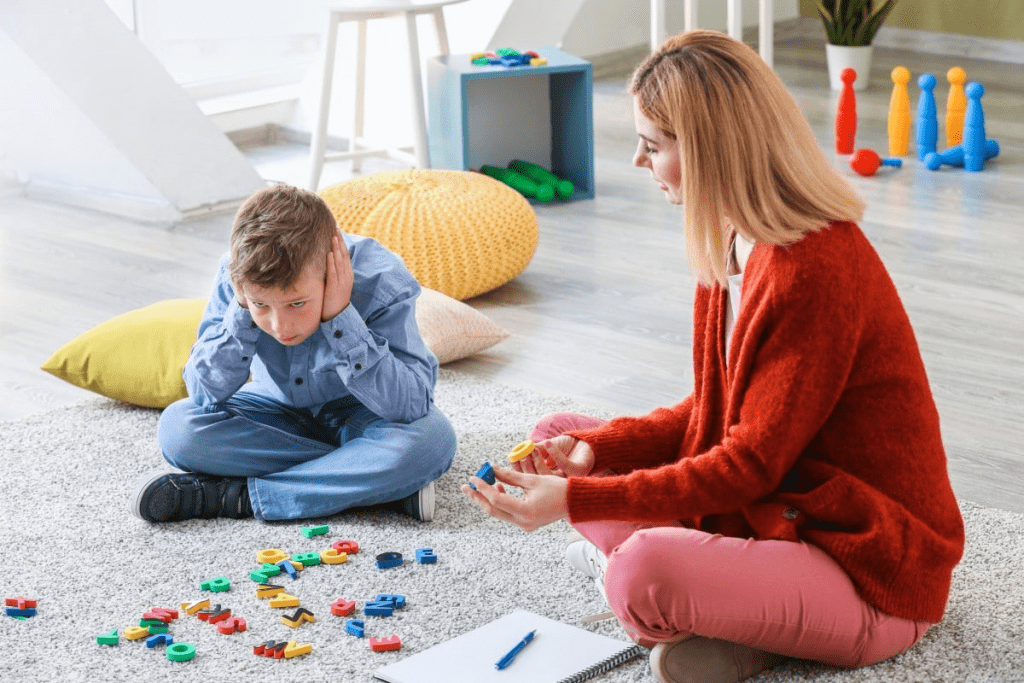Many parents worry about developmental delays in their children. It’s important to know if these delays are due to Autism Spectrum Disorder (ASD) or other reasons.
At LivHospital, we focus on accurate diagnosis and support for kids with developmental delays. Not every child with delays is autistic. Many other conditions can affect speech, movement, and learning, impacting millions of kids every year.

It’s key to understand the developmental delay definition and its effects. We delve into the different types of developmental delays and their link to autism. This way, parents and caregivers can get the help they need.
Key Takeaways
- Developmental delays can happen in kids without Autism Spectrum Disorder (ASD).
- Many non-autistic conditions can lead to delays in speech, movement, and learning.
- Getting the right diagnosis is vital for proper support.
- Knowing about developmental delays helps find the best ways to help.
- Children with developmental delays need all-around support and guidance.
Understanding Developmental Delays in Children
Spotting developmental delays early is crucial for kids who need extra support. These delays happen when children take longer than usual to hit certain milestones.
Definition and Common Signs
A developmental delay happens when a child misses milestones on time. Signs include speech, motor, and thinking skills not developing as expected. For example, a child might not start talking or struggle with physical tasks like walking.
The CDC says about 17% of kids in the U.S. between 3 and 17 have developmental disabilities. This shows how vital it is to catch and tackle delays early.
Five Main Developmental Domains Affected
Delays can show up in several areas, including:
- Speech and Language: Trouble with talking, understanding, or sharing thoughts.
- Motor Skills: Issues with big movements like walking or small ones like using hands.
- Cognitive Development: Problems with solving problems, remembering, or learning.
- Social-Emotional Development: Hard time managing feelings or getting along with others.
- Adaptive Skills: Trouble with everyday tasks like getting dressed or eating.
Normal Variation vs. True Delay
It’s key to tell normal development pace from a true delay. While some kids grow more slowly, big delays or those in many areas might need a doctor’s check-up.
Knowing the difference helps parents and caregivers get the right help for their kids. This ensures they get the support they need to do well.
The Prevalence of Developmental Delays vs. Autism
It’s important for parents and doctors to know about developmental delays and autism. These issues greatly affect children and their families. They can change a child’s life in big ways.
CDC Statistics on Developmental Disabilities
The Centers for Disease Control and Prevention (CDC) shares important data on developmental disabilities. They say these disabilities affect a lot of children. These can be mild or severe and include many different conditions.
Key statistics from the CDC include:
- About 17% of children in the United States have a developmental disability.
- Autism Spectrum Disorder (ASD) is found in about 1 in 36 children.
- These numbers show we need to be aware and act early to help.
Autism Diagnosis Rates Compared to Overall Delays
While 1 in 36 kids are diagnosed with ASD, 17% of kids have developmental delays. This shows many kids face challenges not linked to autism.
The comparison between autism diagnosis rates and overall developmental delays reveals:
- Many kids with delays don’t have autism.
- We need to assess each child fully to find the cause of delays.
- It’s key to tailor help to each child’s specific needs.
Why These Numbers Matter for Parents
These stats are more than just numbers. They affect parents and caregivers deeply. Knowing about developmental delays and autism helps parents watch their child’s growth closely and get help when it’s needed.
By being informed, parents can:
- Spot early signs of delays or autism.
- Get the right medical checks and help.
- Support their child’s growth with smart choices.

How Developmental Delay Differs from Autism Spectrum Disorder
Many people get confused between developmental delay and autism. It’s important to know the differences. Both can affect a child’s growth, but they need different ways to be diagnosed and treated.
Core Characteristics of Autism
Autism Spectrum Disorder (ASD) shows up as trouble with social communication and interaction. Kids with autism might find it hard to connect with others, understand body language, and keep friendships.
Key features of autism include:
- Difficulty with eye contact and understanding social cues
- Delayed or absent language development
- Repetitive behaviors or restricted interests
- Sensory sensitivities or difficulties with sensory integration
Overlapping Symptoms That Cause Confusion
Both developmental delay and autism can show up as speech and language problems. This makes it hard to tell them apart. Kids with either condition might struggle with talking, socializing, and doing everyday tasks.
“The challenge lies in distinguishing between developmental delays that are part of a broader autism spectrum disorder and those that are not. A comprehensive assessment is crucial for an accurate diagnosis.”
Key Differences in Presentation and Prognosis
Children with developmental delays might catch up with the right help. But kids with autism often need special, ongoing support. How well a child with autism does depends on how early they get help and how severe their symptoms are.
It’s key for parents and doctors to understand these differences. This way, they can give the best support and help for kids with developmental issues.
When looking at speech delay vs autism or wondering if a child has autism or speech delay, look deeper than just symptoms. A full check-up can figure out if a child’s delays are part of autism or something else.
Types of Developmental Delays Not Related to Autism
Developmental delays can happen in many areas, not just with autism. They can come from genes or the environment. It’s key for parents and caregivers to know about these delays to help their children.
Speech and Language Delays
Speech and language delays are common. Kids might struggle to make sounds or speak in sentences. They might also have trouble understanding or using language. Learn more about the types of developmental delays.
These delays can be due to hearing loss, developmental disorders, or neurological issues. Early help is crucial. Speech-language therapy can greatly help a child’s communication skills.
Motor Skills Delays
Motor skills delays affect a child’s physical actions. This includes fine motor skills like grasping and gross motor skills like walking. Kids with these delays might seem clumsy or have trouble with coordination.
These delays can stem from neurological conditions, muscular dystrophy, or other health problems. Physical therapy is often suggested to improve motor skills.
Cognitive and Learning Delays
Cognitive and learning delays affect how a child processes information and learns. They might struggle in school or with new situations.
These delays can be due to genetic conditions like Down syndrome or prenatal exposure to substances. Educational support and cognitive training can help.
Social-Emotional Developmental Delays
Social-emotional developmental delays involve challenges with emotions and social interactions. Kids might have trouble understanding social cues or expressing their feelings.
These delays can be linked to environmental factors and genetics. Behavioural therapy and social skills training can be effective.
Common Causes of Non-Autistic Developmental Delays
Developmental delays have many causes, both inside and outside the body. They can come from genetics, prenatal issues, birth problems, and the environment. Knowing these causes helps us find better ways to help.
Genetic Factors and Inherited Conditions
Genetics are a big part of developmental delays. Conditions like Down syndrome and fragile X syndrome can cause delays. These conditions can affect how well a child thinks, moves, and talks.
Prenatal Complications and Exposures
Pregnancy problems, like infections and toxins, can harm a baby’s development. For example, maternal alcohol consumption can lead to fetal alcohol spectrum disorders. These disorders can cause developmental delays.
Birth Trauma and Prematurity
Birth issues and being born too early can also cause delays. Brain injuries from delivery problems and early birth can affect development. Premature babies need extra care and help to catch up.
Environmental and Socioeconomic Factors
Things like socioeconomic status and environmental toxins can also affect development. Kids from tough backgrounds might face more challenges. But early education and healthcare can help.
Medical Conditions That Present with Developmental Delay
Some medical conditions can cause developmental delays in kids. It’s important to know about these to help them properly.
Down Syndrome and Chromosomal Disorders
Down syndrome is a genetic issue linked to an extra chromosome 21. It often leads to speech, language, and thinking delays. Other chromosomal problems, like Trisomy 13 and Trisomy 18, can also cause big delays.

Cerebral Palsy and Neurological Conditions
Cerebral palsy affects movement and muscle tone. It can cause delays in learning to move and do fine tasks. Other brain issues, like muscular dystrophy and spinal muscular atrophy, can also slow down development.
Sensory Impairments
Loss of hearing or vision can really slow down a child’s growth. Kids with hearing loss might struggle with talking and understanding. Those with vision problems might find it hard to learn and move.
Metabolic and Endocrine Disorders
Issues like hypothyroidism and phenylketonuria (PKU) can also lead to delays. Catching and treating these early can help a lot.
Global developmental delay affects 1%-3% of young kids. It’s often due to conditions like Down syndrome or cerebral palsy. Knowing the cause is key to helping them.
Global Developmental Delay vs. Autism: Understanding the Distinction
It’s important to know the difference between global developmental delay and autism spectrum disorder. Both affect a child’s growth, but they have unique traits and impacts on their future.
Defining Global Developmental Delay
Global developmental delay (GDD) is when kids under five lag behind in many areas. This includes thinking, moving, speaking, and social skills. GDD affects about 1-3% of preschool children, which is a small but important group.
Prevalence Rates
About 1-3% of preschool kids have GDD. This shows we need to spot and help these children early.
Diagnostic Criteria and Assessment
To diagnose GDD, we look at a child’s growth in many areas. Developmental screening tools and team evaluations help find GDD and tell it apart from autism.
Long-term Outcomes and Support Needs
How well a child with GDD does later on depends on their delays and help they get. Early help, like speech and physical therapy, is key. Knowing the difference between GDD and autism helps tailor support for each child.
In summary, while GDD and autism share some challenges, they are different. Understanding these differences helps us support children and their families better.
The Diagnostic Process for Developmental Concerns
The journey to diagnose developmental concerns starts with screening tools and checking developmental milestones. Early detection and action are key for kids with delays. We’ll look at the steps in this process.
Screening Tools and Developmental Milestones
Screening tools help find kids at risk for delays. They check areas like thinking, moving, speaking, and social skills. We use these tools to see how a child meets developmental milestones.
Developmental milestones show a child’s growth. They include sitting, walking, talking, and social skills. Healthcare pros use these to spot delays and decide on more tests.
The Multidisciplinary Assessment Approach
A team of experts is key for diagnosing developmental issues. This team includes doctors, psychologists, and therapists. They work together to check a child’s development.
The assessment looks at the child’s medical history and behaviour. It also uses special tools. This way, we get a full picture of the child’s development.
Differential Diagnosis Challenges
Differential diagnosis is tricky because different conditions can look similar. This is especially true for developmental delays. It’s important to figure out the exact issue for the right treatment.
For example, autism symptoms can be mistaken for other delays. A detailed diagnosis is needed to find the right cause and plan the best treatment.
When Further Evaluation is Needed
If a screening shows a possible delay, more tests are needed. Specialists like speech therapists or occupational therapists may be involved.
We also keep an eye on the child’s progress with regular checks. Early help can make a big difference in a child’s future.
Speech Delay or Autism: Spotting the Differences
Understanding the difference between speech delay and autism requires looking at a child’s communication and social behaviours. Both conditions can make it hard for kids to talk, but they have different signs and effects on growth.
Isolated Speech Delays vs. Communication Patterns in Autism
Kids with speech delays might have trouble talking, but can still get their point across in other ways. On the other hand, kids with autism face challenges in both talking and non-verbal communication.
“Kids with autism might find it hard to get the tone of voice or sarcasm, leading to misunderstandings,” says A pediatric specialist. “Their communication issues often go hand in hand with limited interests and repetitive actions.”
Social Engagement Differences
Kids with speech delays usually try to connect with others and use gestures to talk. But kids with autism might find it tough to start or keep up conversations.
- Difficulty making eye contact
- Challenges in understanding social cues
- Preference for solitary play
Non-Verbal Communication Skills
Kids with speech delays usually keep their non-verbal skills, like gestures and facial expressions. But kids with autism might struggle with these, making it harder to get their message across or respond to others.
Getting help early can really help kids with either condition. Knowing the difference between speech delay and autism helps parents find the right support.
Response to Intervention Approaches
How a child responds to help is a big difference between speech delay and autism. Kids with speech delays often get better with speech therapy. But kids with autism might need more, like behavioural therapy and social skills training, to meet their needs.
Early help is crucial for kids with either condition. Tailoring the help to what the child needs can greatly improve their life and growth.
“Early identification and intervention can make a significant difference in the lives of children with autism or speech delays,” notes a leading expert in pediatric developmental disorders. “It’s crucial for parents and caregivers to be aware of the signs and seek professional advice if they have concerns.”
Early Intervention Strategies for Children with Developmental Delays
Children with developmental delays can greatly benefit from early intervention strategies tailored to their specific needs. Early intervention is critical for improving outcomes in children with developmental delays. It addresses their unique challenges and fosters overall development.
Types of Therapies and Services Available
Various therapies and services are available to support children with developmental delays. These include:
- Speech and language therapy to improve communication skills
- Occupational therapy to enhance fine motor skills and daily functioning
- Physical therapy to develop gross motor skills
- Cognitive and behavioural therapies to support learning and social-emotional development
These therapies are designed to be flexible and adaptable. They ensure they meet the evolving needs of the child.
Creating Individualized Treatment Plans
Each child with developmental delays has unique needs, requiring an individualized treatment plan. We work with families and healthcare professionals to develop these plans. They are tailored to the child’s specific challenges and goals.
The process involves assessing the child’s current abilities, identifying areas for improvement, and setting realistic objectives. Regular review and adjustment of these plans ensures they remain effective and relevant.
The Critical Importance of Early Action
Early intervention is crucial because it can significantly impact a child’s developmental trajectory. The sooner a child receives appropriate support, the better their chances of overcoming or managing their developmental delays.
Timely intervention can also reduce the risk of secondary complications. These include behavioural problems or decreased self-esteem, which can arise if developmental delays are not addressed.
Measuring Progress and Adjusting Approaches
Regular assessment and monitoring of a child’s progress are essential components of early intervention. This involves using standardized assessment tools and working closely with families to understand the child’s development.
As needed, we adjust the intervention strategies to ensure they remain effective and aligned with the child’s evolving needs. This flexible approach is key to achieving the best possible outcomes.
Supporting Parents of Children with Delayed Development
Dealing with developmental delays is tough for parents. They need a strong support system. Parents are key in getting their kids the care they need.
Navigating Healthcare and Educational Systems
Parents face big challenges in the healthcare and education systems. Knowing the resources and services is crucial. They should learn about developmental assessments and therapies like speech and physical therapy.
Finding Community Resources and Support Groups
Connecting with community resources and support groups is vital. They offer emotional support, practical advice, and a sense of community. These networks help parents feel less alone and more confident in advocating for their kids. Look for local groups, online forums, and organizations focused on developmental delays.
“The support of other parents who understand the challenges and triumphs of raising a child with developmental delays is invaluable.”
Parent Support Group
Managing Emotional Challenges and Expectations
Handling the emotional side of having a child with developmental delays is complex. Parents must adjust their expectations to their child’s reality. Setting realistic goals and celebrating small wins keeps things positive. Getting professional help, like counselling, is also key to managing stress and emotions.
- Practice self-care to maintain emotional well-being.
- Seek support from family, friends, and support groups.
- Celebrate small victories and set realistic goals.
Advocating Effectively for Your Child
Being an advocate for a child with developmental delays means knowing their needs, talking to professionals, and getting the right resources. Parents should actively seek out information and support. This includes working with educators, healthcare providers, and therapists to create a personalized plan for their child.
By teaming up with professionals and using community resources, parents can build a supportive environment. This environment helps their child grow and thrive.
Conclusion:
It’s important to understand how developmental delays and autism spectrum disorder are connected. At LivHospital, we know early help is key, no matter the cause. This is true for both developmental delays and autism spectrum disorder.
Developmental delays can come from many sources. These include genetic issues, problems before birth, and environmental factors. Getting the right diagnosis and treatment is vital for kids to overcome these hurdles.
We aim to provide top-notch healthcare and support for international patients. By teaming up with families and doctors, we help kids get the early help they need. This way, they can grow and succeed.
FAQ’s:
Is autism considered a developmental disability?
Yes, autism spectrum disorder (ASD) is a developmental disability. It affects a child’s social interaction, communication, and behaviour.
How do I distinguish between speech delay and autism?
Speech delay means a child is slow to talk. Autism is a broader issue, affecting social skills and behaviour, too. A detailed check-up can figure out why a child is slow to speak.
What are the common signs of developmental delays in children?
Signs of delays include not hitting speech or motor skill milestones. They also include not developing socially or emotionally. Each child shows delays differently.
Can a child have developmental delays without being autistic?
Yes, kids can have delays without autism. Many things can cause delays, like genes, prenatal issues, or the environment.
What is global developmental delay (GDD), and how does it differ from autism?
Global developmental delay (GDD) means a child is slow in many areas of growth. It’s different from autism, with its own signs and effects.
At what age can autism be diagnosed, and can it develop later in childhood?
Autism can be spotted as early as 18-24 months. But it’s often diagnosed around 4-5 years old. Some kids show signs early, while others are diagnosed later.
What are the key differences between developmental delay and autism?
Delay means being slow in many areas of growth. Autism is about specific social, communication, and behaviour challenges.
How do healthcare professionals diagnose developmental delays and autism?
Doctors use many tools to diagnose delays and autism. They check milestones and use a team approach for a full assessment.
What are the benefits of early intervention for children with developmental delays?
Early help is key for kids with delays. It includes special therapies and services. These aim to help the child grow and lessen future problems.
How can parents support children with developmental delays?
Parents can help by understanding healthcare and education. They should find community help, manage their feelings, and fight for their child’s needs.
REFERENCES:
Lizard Centre. (2022, October 30). Global developmental delay vs autism: Understanding the differences and similarities. https://lizardcentre.com/global-developmental-delay-vs-autism/
Super Kids Consulting. (2024, August 18). The differences: Global developmental delay and autism. https://superkidsconsulting.com.au/understanding-the-differences-global-developmental-delay-vs-autism/
Fratnow Autism. (2024, February 2). Developmental delay vs autism spectrum disorder (ASD). https://autism.fratnow.com/blog/developmental-delay-vs-autism-spectrum-disorder/











